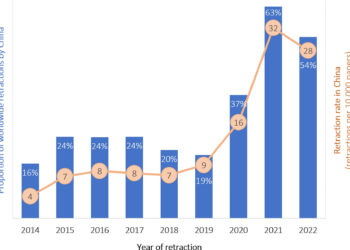Yesterday, the Chronicle of Higher Education ran a story about how at least two libraries are breaking free from the big ticket payments and large journal collections tied up in Big Deals, and shifting to a per-title subscription model, especially in the more expensive areas like biomedicine and chemistry.
The two libraries profiled — the University of Oregon and Southern Illinois University — are both finding that their fears of faculty revolt with certain titles missing haven’t transpired. In fact, journals from some of the Big Deal publishers have instead drawn the ire of faculty, who refuse to submit papers to them.
Jonathan A. Nabe, collection-development librarian at SIU, is quoted as saying:
We simply could not afford to stay in the deals, because by their very nature those deals locked us into a specific amount of money that we had to provide every year, and that increased every year 5 or 6 percent. We just could not sustain that.
Usage data has been something these librarians have wielded to understand the risk involved in canceling journal bundles and knowing which journals to preserve through direct subscription. It was only a matter of time before these inevitable trends — high usage of certain titles offset by low or no usage of filler titles — became clear to librarians and common knowledge. After all, the architecture of the Big Deal is clearly a herd approach — protect the sick and weak within the strong and vibrant. Now, however, librarians looking for a deal can more readily identify their prey.
David C. Fowler, head of licensing for the University of Oregon, said that once they got one of the Big Deal publishers to the table (no mean feat):
Elsevier played pretty fair. I would say that they were at least moderately surprised that we were so well prepared with our facts and figures, but it was a good thing for us.
This brought to mind a post published here last February by Joe Esposito, where Joe wrote:
[Librarians] tend to think of the principal economic relationship as being between the library, which acts on behalf of its patrons, and publishers. This is incorrect. The key relationship is between the successful (and often large) publishers and the less successful. The question is how to grab more of a shrinking pie. The Big Deal is a means to that end.
Armed with data and forced to innovate in the face of continued budgetary pressures, librarians may be able to take back the relationship in a way more suited to their model of how the world should work. What this could mean for the power relationships between smaller society and independent publishers and larger congolmerates won’t be seen for years, but this is another hint that an approach of accumulating titles into bigger and bigger packages with little rhyme or reason has clear vulnerabilities.
Discussion
5 Thoughts on "Will a Renewed Re-examination of the Big Deal Itself Be a Big Deal?"
Cancellations, while they may be painful, remind me that the journal market is still working and that there is no monopoly grip on subscribers.
We should remind ourselves that the “herd” metaphor (protecting the sick and weak within the strong and vibrant) only goes so far as there are pressures for portfolio publishers to cull their own package titles in order to contain costs.
And we should also remember that articles like the one in the Chronicle are rarely followed-up when a publisher renegotiates terms with a library the following year. With much media attention, the Cornell University Library cancelled its package deal with Elsevier for 2004 only to quietly reinstate it the following year. I’m not sure what happened with the proposed boycott of Nature Publishing by the California University system, but I imagine that they were able to negotiate a deal in the end as well.
I commented on that Chronicle article because it quoted the AAP’s John Tagler as claiming that publishers will be worried if more libraries begin ditching the Big Deal. But he forgets that the AAP represents small as well as big journal publishers, and the smaller publishers will probably be cheering this trend–in line with what Joe Esposito said.
Thanks for this post, Kent. I wanted to respond to Phil’s useful point about further media coverage. I’ve been checking back with UC and the Nature group about their negotiations; last time I checked, not long ago, I was told told the parties were “amicably” working on a deal but hadn’t settled on one. That’s why you haven’t seen a follow-up story yet.
Sandy, I didn’t take Tagler’s comments (which I paraphrased) to mean that every single publisher would be upset. He does point out that deals come in many shapes and sizes.
Thanks for the clarification. I’d hope John would not make this kind of mistake even though the larger publishers dominate the board and decisionmaking of the AAP.





